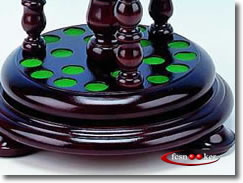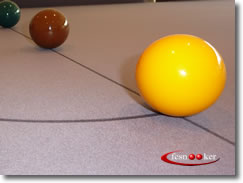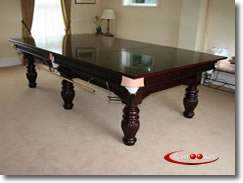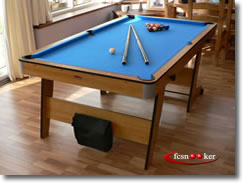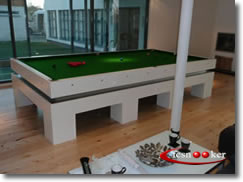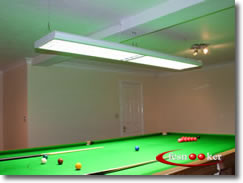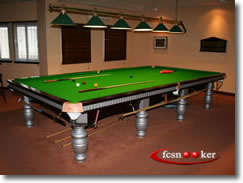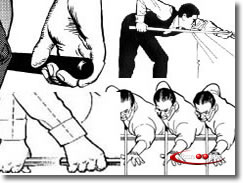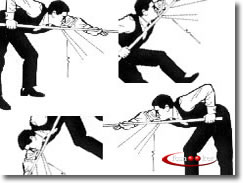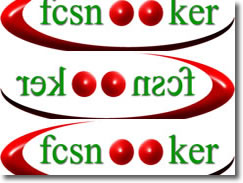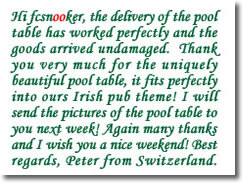 |
|
|
fcsnooker
- Top Quality Snooker Coaching and Instruction in association
with Mr Frank Callan -
The Mind Game - |
 |
|
This can be done in practice exercises on your own, perhaps completing
the 'line-up' and Although a person's highest break score is not an accurate reflection of their ability the average break a player regularly achieves provides useful information to the coach helping them improve performance.
Assessing your game will allow you to begin to practice some of the things required to improve. 'Work smarter not harder'. Breaks 1 - 30
If you regularly achieve breaks between 1 and 30 you are clearly
just beginning the game and have not You are capable of potting four or five balls in succession, but nothing more. Your cue ball control will be poor and it is doubtful that you are cueing straight.
It is imperative that you now begin to practice the right things in the right way or you will not improve. Breaks 31- 60
To be regularly achieving breaks between 31 - 60, displays a decent
level of ability and represents You will have practiced a lot to improve your knowledge and expertise, working hard at certain aspects of your game to become this good. Progressing beyond this stage to the next level will however be very difficult. This will require many hours practice and dedication, honing your cue action, learning to control the cue ball and discovering the shots that facilitate bigger breaks. At this stage your learning curve remains very high, with a study of the more advanced techniques required to progress. Breaks 61 - 99 Well done! Regular breaks at this stage demonstrate dedication, talent and ability, and a determination not to be defeated by one of the hardest games in the world to master.
It may be years before you reach a century - of course, you may
never do it. To reach your goal you must increase your practice
regime and heighten your learning curve. Continue to work on your
cue action and technique, Crossing the century barrier can be very difficult mentally. It may take a number of near misses, spread over a number of months before you get there. I know of many players that have reached this level nut have still not achieved the magical century break. More hard work is required to move to the next level. 'Don't give in now, keep the dream alive'. Breaks 100 + The century plus player combines talent, dedication and mental strength. A player's first century break is one of the highlights of his snooker career, and details of it are remembered forever. Clearly to achieve this standard takes many years of hard work, development and continuous improvement.
So where do you go from here? Reaching the century plus pinnacle represents your own personal achievement and satisfaction, but does not guarantee an income from the game. It is a harsh fact of life that reaching this stage, however difficult, represents only the first stage of your snooker career. Developing this further to become a professional player, requires unswerving dedication, outstanding talent and aptitude for the game and unfortunately, large financial support and mental toughness. 'With these factors in place however, there are still no guarantees'.
Visit
the links below for further information>>>>>>>>>>>>>>>>>
|
|
|
|||
|
fcsnooker
- The Frank Callan Suite - 282 Ribbleton Lane, Ribbleton, Preston,
Lancashire, England - PR1 5EB - tel.
+ 44 (01772) 702211 - info@fcsnooker.co.uk |
| Snooker
Tables, Snooker Dining Tables, English Pool Tables and American
Pool Tables are very heavy, durable and long-lasting pieces of leisure
equipment. Shown below are many examples of recently installed table
products in clients home addresses. |
|||
| Quick
Links to the fcsnooker Online Shopping
Catalogue - Buy Products Online |
|||
| Useful
information to consider before making any Snooker
or Pool table purchase |
|||
| Snooker
Coaching - Hints and tips, practice routines and a large array of
supporting information |
|||
| General
information related to fcsnooker, how
to place orders for products, buying terms and conditions, plus
table delivery and installation guidance. |
|||
| To order a newly manufactured snooker or pool table a 10% deposit will be required to book into the fcsnooker order book. Deposit payments are non-refundable should any table order be cancelled. Final remittance payments payable after the table is fully installed and all products and services have been completed. |
|||
| The
Frank
Callan Suite - 282 Ribbleton Lane, Preston, Lancashire, England
- PR1 5EB Company Registration Number: 039 380 85 - VAT Registration Number: 732 5275 41 © 2012 fcsnooker. All rights reserved. |
|||
|
|
|||

 To
progress at any sport it is important to regularly assess your
own development. This can be done in a number of ways at snooker,
but one way, which is widely used, is to monitor and record the
level of breaks you are achieving on a regular basis.
To
progress at any sport it is important to regularly assess your
own development. This can be done in a number of ways at snooker,
but one way, which is widely used, is to monitor and record the
level of breaks you are achieving on a regular basis. in competitive frames against your peers. Lastly, the range of
breaks you are achieving in match play may also provide some useful
guidance.
in competitive frames against your peers. Lastly, the range of
breaks you are achieving in match play may also provide some useful
guidance. A
regular 20 -30 break player, may need to practice shots which
dislodge more balls from the cluster, in order to enhance his
break building potential. A 70 - 80 break player however, may
need to work on the mental side of the game to achieve the holy
grail of century breaks.
A
regular 20 -30 break player, may need to practice shots which
dislodge more balls from the cluster, in order to enhance his
break building potential. A 70 - 80 break player however, may
need to work on the mental side of the game to achieve the holy
grail of century breaks. progressed
beyond many of the basic requirements of snooker.
progressed
beyond many of the basic requirements of snooker. Careful
consideration of everything that you do at the snooker table is
now required, from your grip, stance, sighting, cue action onwards.
Careful
consideration of everything that you do at the snooker table is
now required, from your grip, stance, sighting, cue action onwards. a
creditable achievement.
a
creditable achievement. You
have the determination, work ethic and many of the shots to make
centuries but do you have the natural ability and mental strength
to carry you on?
You
have the determination, work ethic and many of the shots to make
centuries but do you have the natural ability and mental strength
to carry you on? whilst
learning from others and perhaps most importantly focus your mind
to the task in hand.
whilst
learning from others and perhaps most importantly focus your mind
to the task in hand.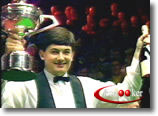 There
are very few shots that the century plus man does not know or
cannot play, but reaching this stage does not guarantee a total
understanding of the sport. There are many famous examples of
top sportsmen who have reached a tremendously high standard in
their chosen sport, but have watched it tumble around their ears
because they could not spot a
There
are very few shots that the century plus man does not know or
cannot play, but reaching this stage does not guarantee a total
understanding of the sport. There are many famous examples of
top sportsmen who have reached a tremendously high standard in
their chosen sport, but have watched it tumble around their ears
because they could not spot a fault developing and put it right.
fault developing and put it right.

















